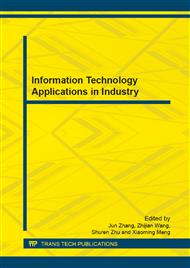p.114
p.118
p.125
p.131
p.135
p.139
p.143
p.147
p.152
An Improved Direction-of-Arrival Estimation Method Based on Sparse Reconstruction
Abstract:
In this paper, we account for efficient approach of direction-of-arrival estimation based on sparse reconstruction of sensor measurements with an overcomplete basis. MSD-FOCUSS ( MMV Synchronous Descending FOCal Underdetermined System Solver) algorithm is developed against to sparse reconstruction in multiple-measurement-vectors (MMV) system where noise perturbations exist in both the measurements and sensing matrix. The paper shows how sparse-signal model of DOA estimation is established and MSD-FOCUSS is derived, then the simulation results illustrate the advantage of MSD-FOCUSS when it is used to solve the problem of DOA estimation.
Info:
Periodical:
Pages:
135-138
Citation:
Online since:
December 2012
Authors:
Price:
Сopyright:
© 2013 Trans Tech Publications Ltd. All Rights Reserved
Share:
Citation:


